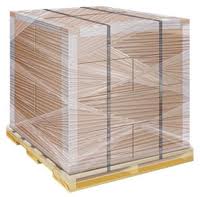 "Pallets move the world” is the slogan of the National Wooden Pallet & Container Association. And it’s true. In the United States, our freight is shipped on an estimated 1.4 billion pallets in active circulation.
"Pallets move the world” is the slogan of the National Wooden Pallet & Container Association. And it’s true. In the United States, our freight is shipped on an estimated 1.4 billion pallets in active circulation.
More companies are palletizing freight for delivery because it’s an easy way to cheaply transport large items. There is also less chance for items to be damaged when being delivered on a pallet. That’s because they are handled by fork lift trucks rather than boxes possibly being thrown from one man to another!
But to ultimately end up at its destination without damage, the pallet must be properly packed. Here are some tips on how to pack a pallet compiled from UPS and FedEx guides:
Choose the right pallet:
- It should be large enough so that your shipment does not overhang the edges.
- Pallets should be sturdy enough to support the load.
- Avoid pallets with broken boards or protruding nail heads.
- Make sure cartons are new and of proper strength to withstand stacking.
- Stack smaller, lighter items on heavier items.
- Securely seal cartons.
- Use proper amounts of dunnage within cartons and leave no spaces between product. Align boxes in columns, corner to corner, for the greatest stacking strength.
- Use a slip sheet or pallet liner paper under the load and every third layer when possible to help distribute the weight evenly and protect the bottom layer.
- Use strapping or banding to secure your shipment to the pallet. It should be drawn tightly to the load, which may require running it underneath the top deck boards of the pallet.
- Stretch wrapping is an effective way to keep all pieces of a shipment together. The plastic stretch wrap should first be applied around the pallet and continued upward around the load. Overlap by 50% and make sure it’s tight to prevent shifting. Stretch wrap can be twisted like rope for greater strength.
- Use a dust cover sheet over the top of your shipment to protect it from the time of packing to delivery.
An edge protector product can reduce the chance of damage. Corner boards increase vertical stacking strength, prevent damage to edges, and stabilize the load. They should extend to the full height and length of the load, and should be used on all corners. This will help maintain the boxes’ shape, rather than being squeezed in by the stretch wrap.
Lower your delivery damage claims by checking out our shipping products.




